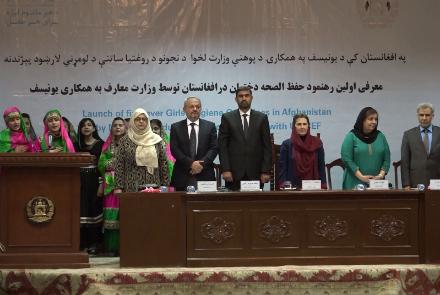The Ministry of Education, with the support of UNICEF and other ministries, celebrated Girls Hygiene Day and launched the first ever Menstrual Hygiene Management (MHM) guideline for teachers in Afghanistan.
The guideline is complemented by comic and simplified materials for adolescent girls, both in and out of schools, UNICEF said in a statement on Tuesday.
The main aim of the guideline is to break taboos and raise awareness about the importance of good menstrual hygiene management for adolescent girls and women in Afghanistan.
While menstruation is biological and a normal phenomenon, UNICEF’s 2016 Formative Research on Menstrual Hygiene Management (MHM), found that lack of knowledge and facilities is a major reason why girls often miss school while menstruating, sometimes resulting in dropping out of school, the statement said.
Accurate and timely information, as well as adequate facilities, are essential to enable girls better manage their menstruation in a hygienic and dignified manner, the statement said. The involvement of teachers and mothers in raising awareness and enhancing education about menstrual hygiene is therefore key to improving retention and reducing school dropout rates amongst girls.
“Attention to personal hygiene and proper nutrition during adolescence are important for girls for better growth and can help avoid health complications and disability,” said Rula Ghani, the First Lady of Afghanistan.
“With good hygiene, they can have better control over their bodies, increase their self-confidence, and improve their attendance in school. Most importantly, healthy girls of today are the future mothers who will safeguard the process of motherhood and decrease mortality rate amongst young mothers,” she added.
The statement said that recent evidence and key findings indicate that 70 percent of girls do not take bath or shower during menstruation for fear of infertility, 29 percent miss some school days when they were having their menses, some 80 percent were not allowed to attend social events such as weddings, or funerals, or going to shrines during menstruation and that 50 percent of girls were not aware of menstruation until their first period started.
Speaking at the event, Acting Education Minister Mirwais Balkhi, said “girls have an irrevocable right to education, which is lost if they feel unable to attend lessons because of a lack of sanitary products or clean, private toilets at school. Governments simply need to ensure that every school has clean water, decent toilets and good hygiene.”
“Better facilities in schools will not only help towards the global promise of universal access to clean water, but are also essential for achieving other Sustainable Development Goals on quality education, gender equality and good health and well-being,” he said.
Along with water and sanitation facilities and sanitary materials, girls need accurate and practical information at the right time.
Girls often turn to their mothers and teachers for support, but if they lack the confidence and information themselves, they may instead perpetuate taboos. A common misperception is that periods are a dirty secret.
“Today is an important occasion to break taboos and encourage girls to grow into healthy and informed women who can share their well-being with their families and communities,” says UNICEF Representative, Adele Khodr.
“The physical and psychological changes associated with puberty is a normal process of life. Understanding menstruation and menstrual hygiene is therefore critical, as it represents a major barrier to girls’ education, empowerment and dignity. We have a collective commitment to ensure that every girl, in every city, town, community and village, and within every family, does not miss out on learning due to lack of unawareness about MHM, and enjoys the dignity of being a girl,” Khodr concluded.


